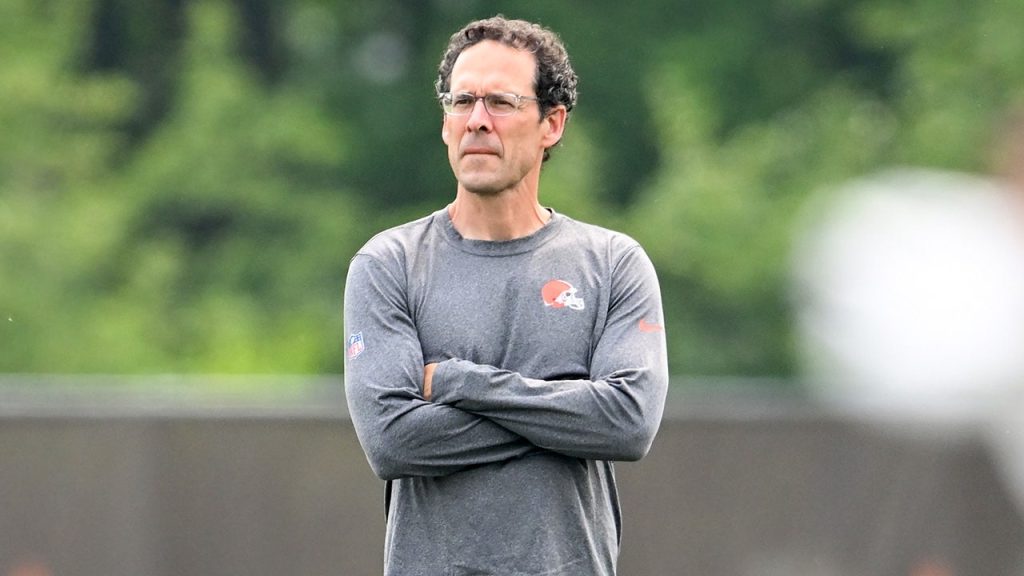Paul DePodesta’s Career Shift and the Deshaun Watson Trade Decision
Paul DePodesta, who recently transitioned from the Cleveland Browns’ chief strategy officer to become the Colorado Rockies’ president of baseball operations, has returned to his baseball roots after eight years in the NFL. This career move marks a significant shift for the analytics expert who previously worked with several MLB organizations, including the Cleveland Indians (now Guardians), Oakland Athletics, New York Mets, and as the Los Angeles Dodgers’ general manager. His return to baseball provides an opportunity to reflect on one of the most consequential decisions he helped make during his tenure with the Browns: the controversial acquisition of quarterback Deshaun Watson.
In a recent interview with The Denver Post, DePodesta provided valuable insight into the organizational decision-making process behind the blockbuster 2022 trade for Watson, which has been widely scrutinized. The Browns not only traded significant draft capital for Watson but also signed him to an unprecedented fully guaranteed $230 million contract. DePodesta emphasized that major decisions like this one are never made by a single person but represent collective organizational choices. “I’m not a believer in the ‘King Scout’ situation where there is one guy who makes every call… The jobs are too complex, the decisions are too hard. They impact too many different things,” DePodesta explained. His perspective highlights the shared responsibility among Browns leadership, noting, “Everyone who was a part of that? We all own that. We just do, that’s part of the deal.”
The Watson acquisition has proven problematic for Cleveland, with the quarterback appearing in just 19 games over three seasons since joining the team. His absence stems from both an 11-game suspension in 2022 related to off-field conduct and subsequent injuries, including a shoulder issue in 2023 and a ruptured Achilles tendon in October 2023. The situation worsened when Watson re-injured the same tendon in January 2024, leading to additional recovery time that has kept him sidelined for the current season. This string of unavailability has naturally raised questions about whether the Browns’ significant investment will ever deliver the expected returns, especially considering the guaranteed nature of Watson’s contract.
Despite these setbacks, Watson himself remains defiantly optimistic about his comeback. In an April 2024 Instagram video showing his rehabilitation process, Watson directly addressed his critics: “Everyone is doubting me. Everyone don’t believe in me. Everyone don’t think I can get back to where I was. But I know, and I believe the work that I put in, that I believe in myself… I know I’m gonna be way better than before.” The 30-year-old quarterback added that he doesn’t “have anything pretty much to lose,” suggesting a mindset focused on proving his detractors wrong. This determination will be tested whenever he returns to the field, as he attempts to recapture the form that made him a three-time Pro Bowler with the Houston Texans.
Watson’s statistical regression since joining the Browns is striking when compared to his performance in Houston. During his Cleveland tenure, Watson has thrown just 19 touchdowns against 12 interceptions in his limited playing time. This stands in sharp contrast to his impressive Texans career, where he accumulated 104 touchdowns with only 36 interceptions over four active seasons. It’s worth noting that Watson’s final year in Houston (2021) was spent entirely on the sidelines following a trade request and subsequent standoff with the organization, foreshadowing some of the complexity that would follow him to Cleveland.
DePodesta’s candid reflection on the Watson decision comes as he embarks on a new challenge with the Colorado Rockies, bringing his analytics-driven approach back to baseball. His willingness to discuss the Watson trade demonstrates professional accountability while acknowledging the inherent difficulties in making franchise-altering decisions. As Watson continues his rehabilitation and the Browns navigate their quarterback situation, DePodesta’s comments provide valuable context on how major sports organizations approach high-stakes personnel decisions. The outcome of the Watson acquisition will ultimately be judged by what happens when—or if—the quarterback returns to form, but DePodesta’s perspective reminds us of the collective nature of front office decision-making in professional sports.


